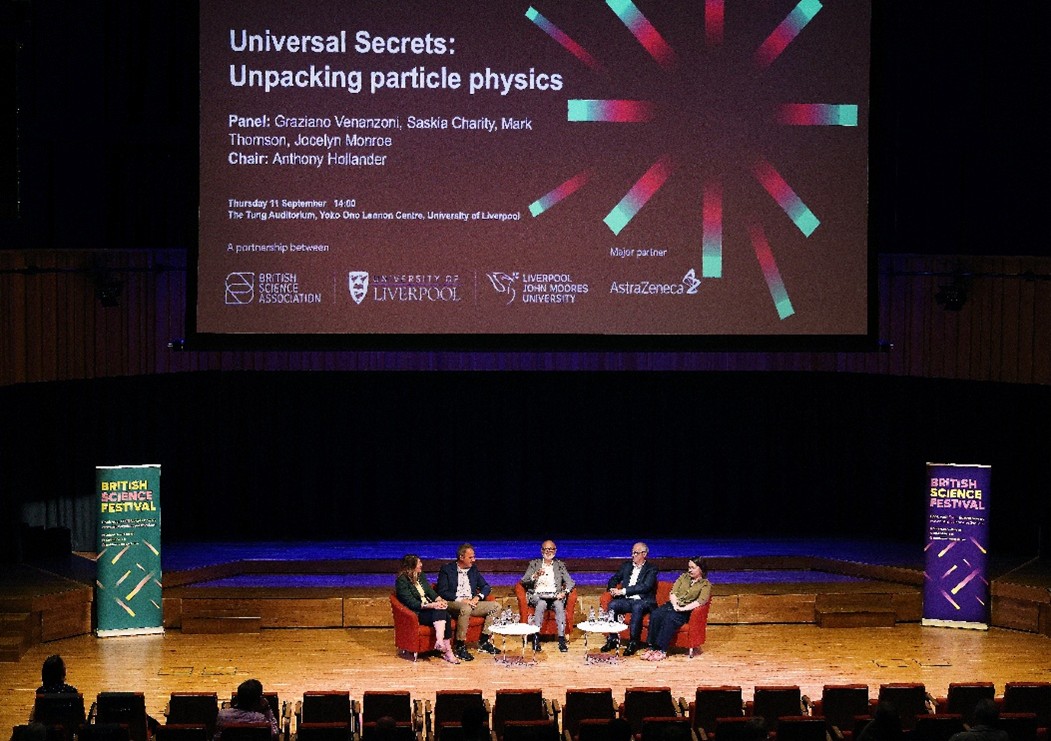
Researchers and students involved with the
A panel event chaired by Professor Anthony Hollander featuring Frontier co-lead Professor Graziano Venanzoni and Dr Saskia Charity, alongside the incoming Director of CERN, Professor Mark Thomson and the University of Oxford’s Professor Jocelyn Monroe, delved into the mysteries of dark matter. ‘Universal Secrets: unpacking particle physics’ was an opportunity to hear from some of the world’s leading physicists who talked about the upcoming experiments at CERN and Fermilab, as well as the people and ideas that inspired them to embark on an academic career in Physics.
A wide-ranging display of particle detectors were also on show in the Fröhlich café in the Yoko Ono Lennon Centre. Research staff were on hand to explain how these complex instruments are made to very precise specifications on the University campus, and then shipped to CERN in Geneva to form part of large-scale experiments to measure some of the smallest building blocks of the universe.

Professor Carl Gwilliam, Liverpool Team Leader for ATLAS showcases particle detectors at BSF
It was also fantastic to have representatives from the Science and Technology Facilities Council (STFC) join us for the Festival, including members of the team who work at the Boulby Underground Mine who were able to speak directly to the audience via a live videocam. Boulby is the UK’s deepest mine, and has been host to many scientific experiments since the 1990s. Today it serves as a testing base for a range of scientific research, from astrophysics through to climate science, geology and planetary exploration equipment, with many Liverpool researchers conducting experiments there.
Unique installations in the city and on campus also provided opportunities to engage with Physics in news ways. Geist is a large-scale sculpture which offers a window into a figment of reflection and light, created by a mirror illusion and showing a suspended illuminated orb. The illusion is interactive - the proximity and movement of the audience makes the suspended particle of light come to life. Individually addressable LED modules flicker and glimmer in the presence of people and it was brilliant to see people of all ages experimenting with it in the busy shopping area near Liverpool One.
Closer to home, we hosted Code of the Universe, a travelling photographic exhibition that explores the global quest to understand the complexity of the world around us. The exhibition featured 40 illuminated panels that present open questions in modern physics such as ‘What is our universe made of?’ and ‘What laws make life possible?’. The exhibition was accompanied by a new augmented reality (AR) app co-developed by University of Liverpool researchers to help the public understand how fundamental research can lead to real-world innovations, from medical technologies to digital infrastructure.
Professor Carsten Welsch, who co-developed the exhibition said: “This was a unique opportunity to step inside the fascinating world of physics, it was brilliant to see so many people stopping to engage with it. We still don’t know why matter and antimatter were not created in equal amounts at the birth of the Universe, or what dark energy is – the mysterious force driving its accelerated expansion. These open questions remind us how much more there is to discover about the origins of the Universe.”
Reflecting on the panel event Dr Saskia Charity said: “I very much enjoyed taking part in the Universal Secrets event alongside esteemed colleagues and collaborators. It was an excellent platform to talk about our world-leading research in Particle Physics, and the part Liverpool plays in major particle physics experiments across the world.”
Read more about the wider Physics department events at the British Science Festival here.